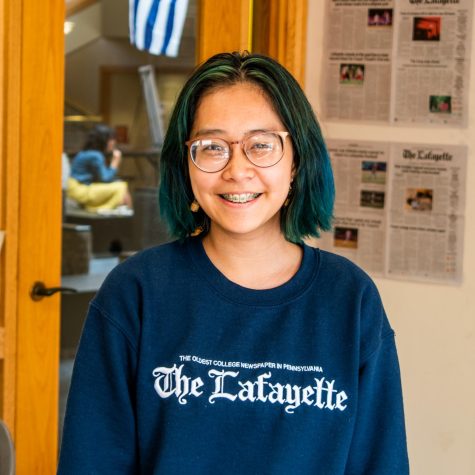For Nahin Ferdousi ’19, sexual assault on campus is and always has been a Greek life problem.
In a talk hosted by Pards Against Sexual Assault this past Tuesday, Ferdousi spoke about her experiences with sexual assault on campus and Greek life, as well as the relationship between the two.
“This is going to be an uncomfortable conversation,” Ferdousi said, prefacing the talk.
Her sophomore year at Lafayette, on the night of her initiation into the Tri Delta sorority, Ferdousi was sexually assaulted at a Greek life party by a senior fraternity member.
“And after that happened, it became a Greek life problem,” Ferdousi said of the assault. “The reason I say it became a Greek life problem is because the fraternity decided it was more important to protect their brother than to care for the fact that I came forward and said I was raped.”
Ferdousi described her expectation as a sophomore that the fraternity member would be punished.
“They have to kick this person out,” Ferdousi said, recounting her thought process after the assault. “Look at what he did to me.”
Despite the fact that multiple other survivors came forward and accused this fraternity member of sexual assault, he was only kicked out of the organization for a few weeks before he was invited back in, she said.
Ferdousi described how, after that, the fraternity sent members of the fraternity whom she considered to be her friends to try and convince her not to speak out about the sexual assault. Additionally, Ferdousi recalled overhearing comments blaming her for the assault, being stalked around campus by fraternity members in an attempt to intimidate her into silence, and watching her sorority sisters in Tri Delta face backlash for defending her.
“While I was able to find that support system in a lot of my sorority sisters, it didn’t change the fact that Tri Delta as an organization and many survivors within that organization as well were deemed liars because we were calling out rape,” Ferdousi said.
Although Ferdousi’s assault occurred in 2016, she argued that sexual assault on campus is still a big problem. She cited the Anti-Violence Lafayette instagram page, which documented many stories about sexual violence, some of which occurred within the Greek life community.
“If you’re still under the assumption that this is not a Lafayette problem, this is not a Greek life problem, then I urge you to at least take a look through this page and see some of the stories that your peers have been sharing,” Ferdousi said.
Ferdousi also encouraged members of Greek life to examine their own behaviors when it comes to sexual assault on campus, both on an institutional and an individual level.
“How will your chapter create a safer space for survivors?” Ferdousi said. “Are you willing to make that change? Are you willing to confront that?”
Finally, Ferdousi shared advice for being an ally to survivors of sexual assault.
“The number one thing is to tell them that you believe them. Don’t ask too many probing questions… Direct them to resources, explaining their options… Use positive affirming language, like, ‘I hear what you’re saying.’ And finally, positive body language; always show compassion and attention,” said Ferdousi.
“Just be positive and let them in,” Ferdousi urged. “Be that rock they can lean on in that moment, because it’s a really tough, tough period to go through.”






















































































































